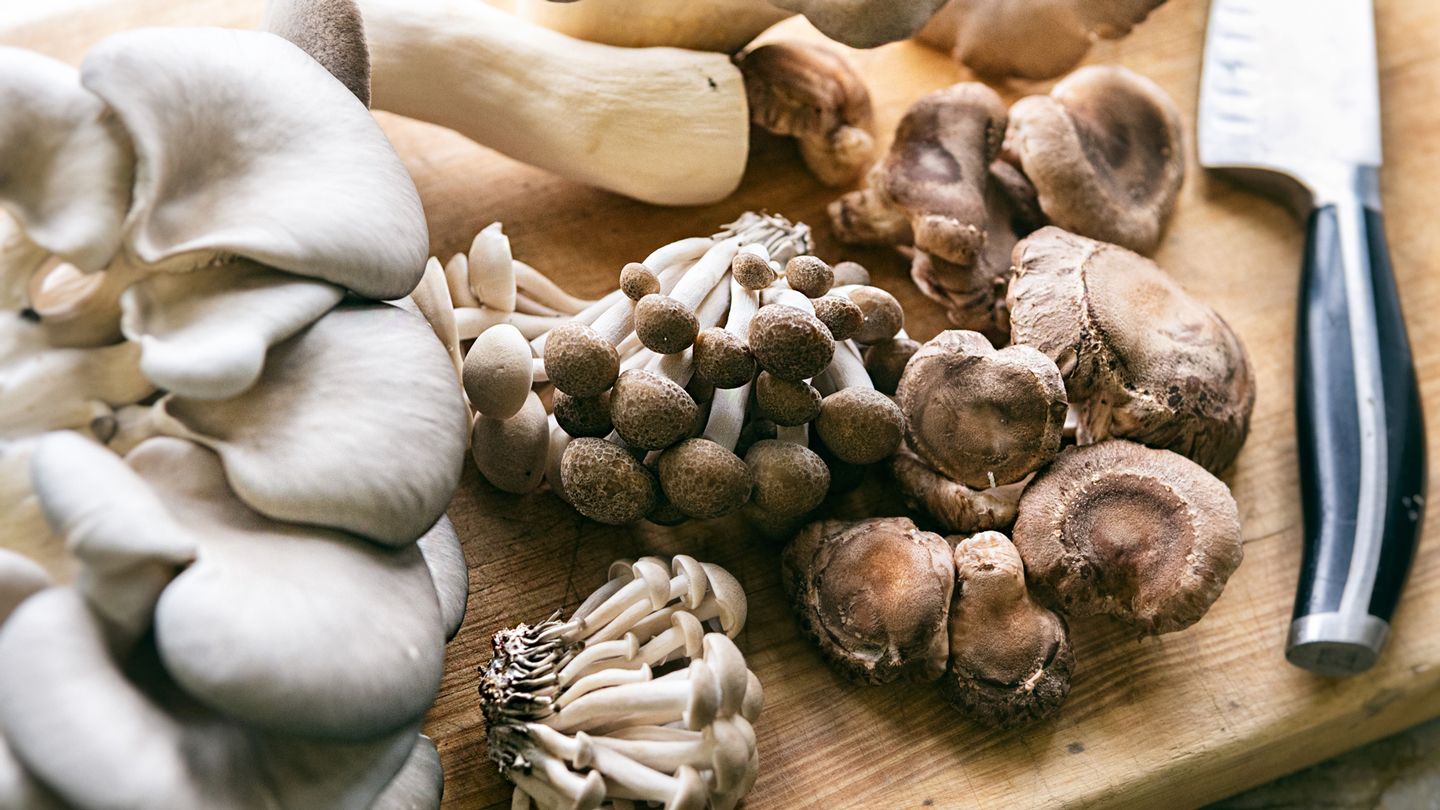
When it comes to versatile and fascinating ingredients in the realm of gastronomy, mushrooms have carved out their own special place. These earthy fungi have been revered for their unique flavors, textures, and medicinal properties for centuries. From the humble button mushroom to the exotic truffle, mushrooms come in a variety of shapes, sizes, and colors, making them an exciting addition to any dish.
However, there is much more to mushrooms than meets the eye. In this article, we will delve into 20 fascinating facts about mushrooms that will leave you amazed. Whether you are a culinary enthusiast, a health-conscious individual, or simply curious about the wonders of nature, these facts will provide you with a deeper understanding and appreciation for mushrooms.
Key Takeaways:
- Mushrooms are not plants, but fungi with unique shapes and sizes. They offer health benefits, but caution is needed as some species can be poisonous.
- From culinary delights to environmental roles, mushrooms are versatile and fascinating organisms with a rich history in medicine, folklore, and cuisine.
Mushrooms are not plants
Contrary to popular belief, mushrooms are not classified as plants, but as fungi. They belong to a distinct biological kingdom separate from plants and animals.
Mushrooms come in various shapes and sizes
From the tiny button mushrooms to the large portobello mushrooms, mushrooms exhibit a wide range of shapes and sizes. Some can even grow as big as an umbrella!
Mushrooms have been used for medicinal purposes for centuries
Mushrooms have been valued for their medicinal properties in traditional medicine systems like Chinese and Ayurvedic practices. They are believed to have immune-boosting, anti-inflammatory, and antioxidant effects.
There are over 10,000 species of mushrooms
With a staggering variety of mushrooms out there, scientists estimate that there are over 10,000 different species worldwide. Each species has its own unique characteristics and properties.
Mushrooms are a good source of nutrients
Mushrooms are low in calories and fat, making them a healthy addition to any diet. They are also packed with essential nutrients like vitamins (such as vitamin D and B vitamins), minerals, and fiber.
Mushrooms can be poisonous
While many mushrooms are safe to eat and enjoy, there are also some species that can be toxic or even deadly. It is essential to be knowledgeable about mushroom identification or consult an expert before consuming wild mushrooms.
Mushrooms can be cultivated
Thanks to advancements in mushroom cultivation techniques, it is now possible to grow mushrooms commercially. This allows for a more reliable and controlled supply of mushrooms for consumption.
Mushrooms play a vital role in the ecosystem
Mushrooms are crucial to the environment as they help decompose organic matter, such as dead plants and trees. They also form symbiotic relationships with certain plants, assisting with nutrient absorption.
Mushrooms have unique flavor profiles
Each type of mushroom has its own distinct taste, ranging from earthy and savory to nutty or even slightly sweet. This variety in flavors adds depth and complexity to culinary dishes.
Mushrooms have been used in traditional folklore and mythology
Mushrooms have been associated with mythical tales and beliefs in various cultures throughout history. They have been depicted as magical or enchanted, symbolizing luck, fortune, or otherworldly realms.
Mushrooms can be cooked in many ways
Whether sautéed, roasted, grilled, or used in soups, stews, or stir-fries, mushrooms are incredibly versatile in the kitchen. They can enhance the flavor and texture of a wide range of dishes.
Some mushrooms have psychedelic properties
Certain types of mushrooms, commonly known as “magic mushrooms” or psilocybin mushrooms, contain psychoactive compounds that can induce hallucinations and altered states of consciousness when ingested.
Mushrooms can be used as natural dyes
The pigments found in certain mushrooms, such as the vibrant red from the Amanita muscaria, have been used for centuries to dye fabrics and create natural dyes for artistic purposes.
Mushrooms can aid in bioremediation
Some species of mushrooms have the ability to break down pollutants and contaminants in the environment. This process, known as bioremediation, is being explored as a sustainable way to clean up polluted sites.
Mushrooms have been used in traditional medicine for respiratory ailments
In traditional Chinese medicine, certain mushrooms, like the reishi mushroom, have been used to support respiratory health and alleviate symptoms of conditions such as asthma and bronchitis.
Mushroom spores are microscopic
The reproductive cells of mushrooms, called spores, are incredibly tiny and can only be seen under a microscope. These spores are responsible for the mushroom’s reproduction and dispersal.
Mushrooms can be foraged in the wild
Foraging for wild mushrooms can be an adventurous and rewarding activity for nature enthusiasts. However, proper knowledge and identification skills are crucial to ensure safety.
Mushrooms have a high water content
Mushrooms are composed of mostly water, which contributes to their unique texture and juiciness when cooked. This high water content also means that they can absorb flavors from other ingredients in a dish.
Certain mushrooms are considered a delicacy
Mushrooms like truffles and morel mushrooms are highly prized in culinary circles and are often associated with gourmet dishes. They have a distinct aroma and flavor that adds richness to dishes.
Mushrooms can grow in unusual places
Mushrooms have the ability to grow in unexpected locations, such as on decaying logs, tree trunks, and even underground. Their adaptability allows them to thrive in various environments.
Conclusion
In conclusion, mushrooms are fascinating organisms with a wide range of interesting facts. They are not only delicious additions to meals, but also offer numerous health benefits. Whether you’re a culinary enthusiast or a nature lover, learning about mushrooms can open up a whole new world of appreciation for these incredible fungi. From their diverse shapes and colors to their unique growth patterns, mushrooms continue to captivate our imaginations. So, the next time you enjoy a mushroom dish, remember the incredible journey these fungi have been on to reach your plate.
FAQs
Q: Are mushrooms a vegetable?
A: Although mushrooms are often considered as vegetables, they are actually fungi and belong to their own kingdom in the biological classification.
Q: Are all mushrooms safe to eat?
A: No, not all mushrooms are safe to eat. Some wild mushrooms can be poisonous and even fatal if ingested. It is important to only consume mushrooms that have been properly identified or purchased from reputable sources.
Q: Can mushrooms be cooked in various ways?
A: Yes, mushrooms are incredibly versatile and can be cooked in various ways. They can be sautéed, grilled, roasted, or used in soups, stews, stir-fries, and even as a meat substitute in vegetarian dishes.
Q: Are mushrooms a good source of nutrients?
A: Yes, mushrooms are low in calories and fat while being rich in essential nutrients like vitamins, minerals, fiber, and antioxidants. They are particularly known for being a good source of B vitamins and selenium.
Q: Can mushrooms be grown at home?
A: Yes, mushrooms can be grown at home using mushroom kits or by creating a conducive environment for their growth. This can be a fun and rewarding project for mushroom enthusiasts.
Mushrooms are truly remarkable organisms, with their diverse shapes, sizes, and colors. From their role in traditional medicine to their delectable flavors in culinary dishes, fungi never cease to amaze. If you're hungry for more mushroom knowledge, explore amazing fun facts about these fascinating creatures. For adventurous souls, learn about the enigmatic world of mushroom hunting and the thrill of foraging in the wild. Mouthwatering nutritional facts about Mellow Mushroom will satisfy cravings while revealing the health benefits of this beloved pizza joint's ingredients.
Was this page helpful?
Our commitment to delivering trustworthy and engaging content is at the heart of what we do. Each fact on our site is contributed by real users like you, bringing a wealth of diverse insights and information. To ensure the highest standards of accuracy and reliability, our dedicated editors meticulously review each submission. This process guarantees that the facts we share are not only fascinating but also credible. Trust in our commitment to quality and authenticity as you explore and learn with us.


